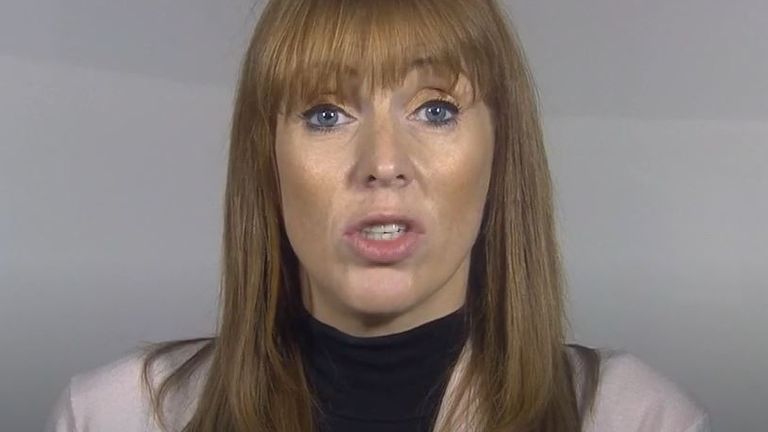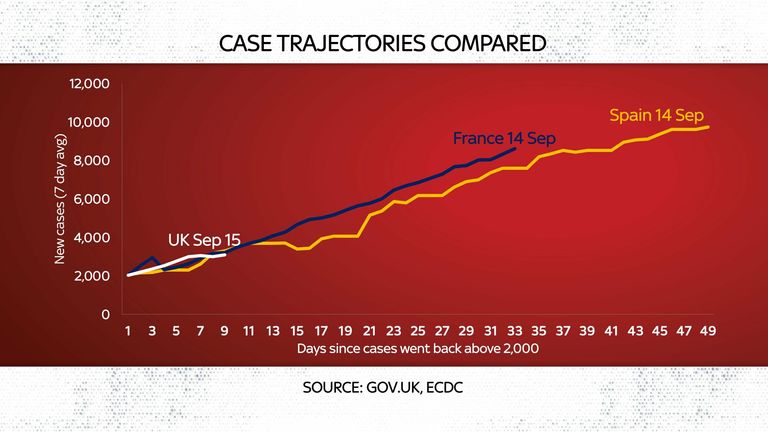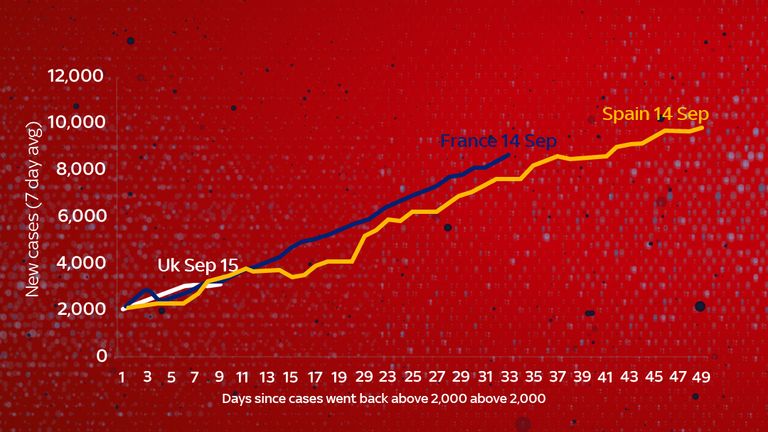Boris Johnson must act now – not next week – to tackle a second wave of coronavirus infections across the UK, an expert in infectious disease control
has warned.
Dr Bharat Pankhania, senior clinical lecturer at the University of Exeter, told Sky News it is “blindingly obvious” what needs to be done to stem the current spike in COVID-19 cases – and that is to minimise one-to-one contact between individuals.
He said: “My advice to Prime Minister Boris Johnson is, don’t sit there and say ‘we are going to do something next week’. It’s tomorrow, it’s today.
“You say, ‘as of today please reduce your circulation in pubs, restaurants, transport, offices and all those places where infection transmits’. It’s as straightforward as that.”
His warning comes as Scottish First Minister Nicola Sturgeon demanded a Cobra meeting in the next 48 hours.
“We know from experience earlier in the year that speed and decisiveness of action is important in the fight against COVID,” she tweeted.
She said the Scottish government “will seek to reach considered decisions as quickly as possible” and urged everyone across Scotland to be “extra careful” and “minimise interactions with other households”.
New confirmed daily cases hit 4,322 – the highest since 8 May – on Friday, and another 27 deaths were recorded. The R number, which shows the spread of the virus, is now between 1.1 and 1.4.
Fears are growing that daily case numbers could, in a few weeks, hit the figures seen in March and April if the government does not take decisive action now.
Proposals are being worked up for a “circuit break” of nationwide restrictions for a short period, which could see essential travel to schools and workplaces continuing, but restaurants and bars would shut – or perhaps run on restricted hours – and different households would be asked not to mix at all.
Asked if he thought a second national lockdown was on the cards, Dr Pankhania told Sky News: “I hope it will never happen because I don’t think the United Kingdom has got the stamina for a national lockdown. It’s words.
“It is blindingly obvious that if you wanted to keep case numbers down you keep your movements amongst fellow human beings to a minimum. It’s as simple as that.
“This is a human-to-human spread of infection, so we have invented all manner of things like the ‘the rule of six’, the curfew at 10pm, and all of that.
“And the one thing, the elephant in the room, that we don’t address is ‘keep your distance away from fellow human beings – move around with as few human beings as is possible’. That is as straightforward as it is.”
Asked if he thought plans to “short-circuit” the virus would work and slow the spread of the disease, he replied: “I would love to say yes, but what we learnt from the first lockdown was that the base number, meaning the background level of circulating virus, continued to hover at an uncomfortably high level.
“So where is the evidence that a ‘circuit break’, meaning a short, sharp shutdown, is going to reduce case numbers?
“Our case numbers have resisted in going down because we just can’t have a full lockdown in the way the United Kingdom has been running.
“So unless you have a really, really strict South Korea-style or even China-style shutdown and people don’t move around between groups, it is not going to happen.”
He added: “The bottom line is we take personal and mutual responsibility, we say to ourselves ‘every action I’m about to take, is this risky?’ If it is, don’t do it.”
:: Subscribe to the All Out Politics podcast on Apple Podcasts, Google Podcasts, Spotify, Spreaker
His sentiments were echoed by Professor Neil Ferguson – the scientist whose modelling led the government to order the nationwide lockdown in March – who said ministers need to act “sooner rather than later” if they are to prevent a second surge leading to more deaths.
“Right now we are at about the levels of infection we were seeing in this country in late February,” he told the BBC Radio 4 Today programme.
“If we leave it another two to four weeks we will be back at levels we were seeing more like mid-March. That’s clearly going to cause deaths because people will be hospitalised.
“I think some additional measures are likely to be needed sooner rather than later.”
He added: “We have in some sense a perfect storm right now of people, as they have been told to, getting back to normal, schools reopening, a surge in cases, so therefore the testing system is under strain.
“So unfortunately we do have to roll the relaxation of measures back a little bit and get contacts down in the population.”
It is understood Professor Chris Whitty, England’s chief medical officer, and Sir Patrick Vallance, the government’s chief scientific adviser, warned the PM at a meeting on Wednesday evening that the UK is now about six weeks behind France and Spain and in danger of seeing a substantial increase in the number of cases by mid-October if the virus is left unchecked.
Labour leader Sir Keir Starmer has joined the First Ministers of Scotland and Wales in calling on the PM for Cobra discussions.
Sir Keir said: “He now needs to take swift and decisive action at a national level to deal with this – he can’t afford to be slow.”




